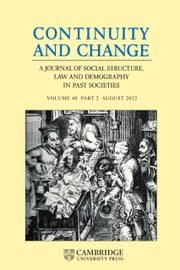Article contents
Suicide and the secularization of the body in early modern Saxony
Published online by Cambridge University Press: 15 June 2001
Abstract
A jurisdictional dispute over the burial of suicides in Electoral Saxony in the years 1702–1706 brought into sharp contrast conflicting views of the body in popular belief and Lutheran pastoral theology, and in the secularizing project of the early Enlightenment. The dispute centred on the practical, local implications of territorialism, a theory of church subordination to the state developed in the 1690s by the Saxon jurist Christian Thomasius (1655–1728), the most influential German political philosopher of the early Enlightenment. Considered in its intellectual and institutional contexts, the Saxon dispute illustrates the importance of the body to an understanding of secularization, the early Enlightenment and the history of suicide.
- Type
- Research article
- Information
- Copyright
- © 2001 Cambridge University Press
- 2
- Cited by




